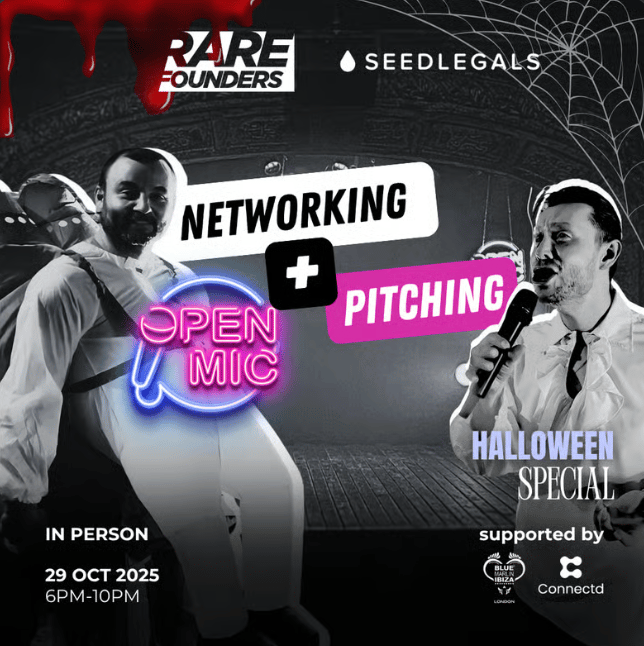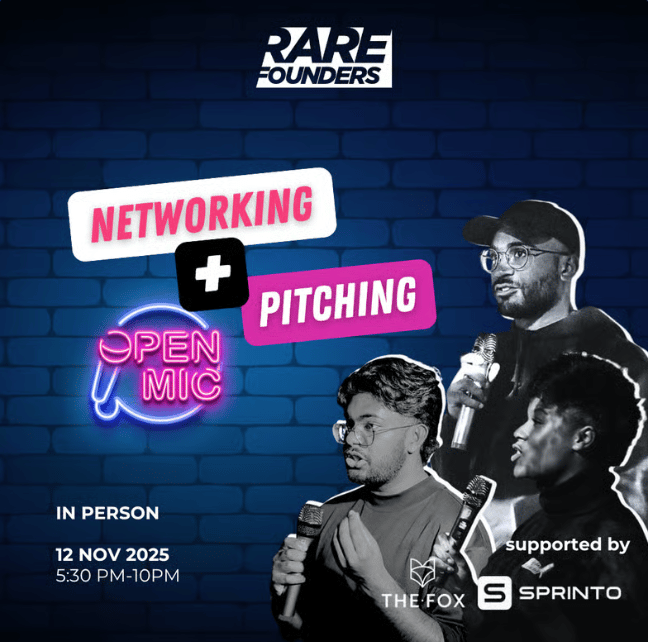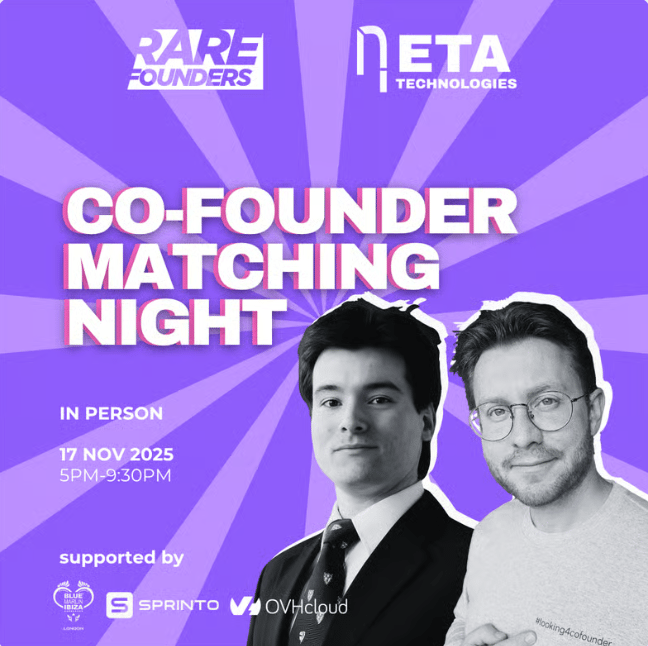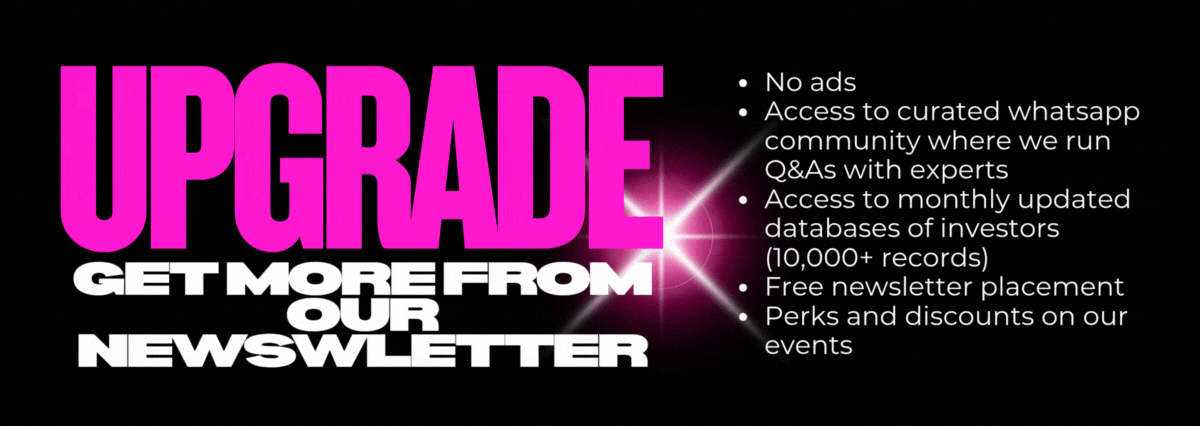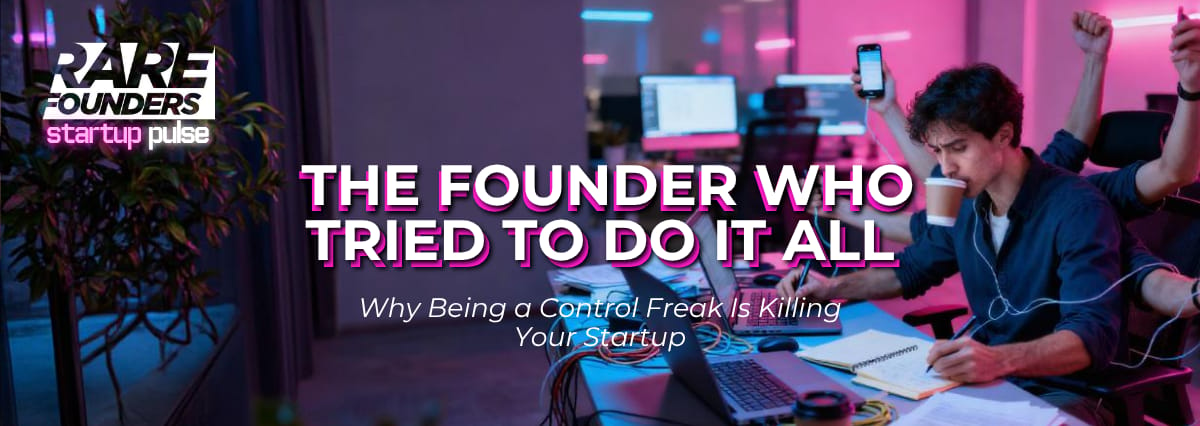
Why Being a Control Freak Is Killing Your Startup
Let’s be honest — most founders are control freaks.
We call it “protecting our vision” or “keeping standards high,” but what we really mean is we don’t trust anyone else to do it right.
And I get it. I’m one of them.
When I started building Rare Founders, I did everything myself — events, partnerships, sponsorships, content, emails, videos. Not because I loved doing all that, but because I thought no one else will do it the way I want.
For a while, that worked. The community grew, events blew up, and people started calling it the most popular founder event in London. But now I’m hitting the same wall Noam Wasserman wrote about in Harvard Business Review back in 2008 — The Founder’s Dilemma.
He nailed it: founders want to be both rich and king — but it’s almost impossible to be both.
Rich vs King
Wasserman studied hundreds of startups and found that every founder eventually faces a brutal choice:
👉 Be rich — build something that scales and raises investment, even if it means losing control.
👉 Or be king — stay in charge, protect your baby, but accept slower growth.
Founders who go for “rich” give up equity, hire strong execs, and share decision-making.
Founders who go for “king” keep control but often hit a ceiling.
Most of us convince ourselves we can do both.
We can’t.
My Reality Check
Rare Founders is growing fast — new partnerships, bigger events, and now a whole data side to the business. But growth means complexity. Suddenly you need systems, teams, and trust.
If you’re still running everything yourself, the business isn’t scaling — you are.
You’re scaling your workload, stress, and burnout.
For the last two years, I’ve been the “king.” Every decision went through me because I wanted things done right.
But I’m realising I’m the bottleneck. If I don’t let go, I’ll end up killing what I built.
The Emotional Trap
Founders fail not because of product or market — but emotion.
We’re attached to our startups like parents to a child. We sacrifice everything, then panic when someone else touches “our baby.”
But that attachment keeps us small.
Wasserman calls it the founder’s paradox — the better you do, the faster you outgrow your own role.
You start as the visionary who makes everything happen. But once the company needs structure, process, and delegation, that same energy becomes resistance.
You don’t want to hand over the CEO role.
You don’t want to let go.
You don’t want to admit someone else might do it better.
But that’s exactly what your business needs.
The Brutal Numbers
By the third year, half of founders aren’t CEOs anymore.
By IPO, fewer than one in four are still in charge.
Not because they failed — because they succeeded.
Success brings investors, boards, and specialists. The founder who built the company becomes the one holding it back.
The irony? The harder you work to make it big, the faster you make yourself replaceable.
The Founder Ego
I see this all the time in our community.
A founder gets traction but refuses to delegate. Rewrites every post, double-checks every pixel, questions every hire.
They say they’re “protecting quality.”
They’re actually protecting ego.
And it’s not arrogance — it’s fear.
When your business becomes your identity, letting go feels like losing yourself.
I’ve felt that too. Every time I delegate and it’s not perfect, my brain goes: “See? That’s why I should’ve done it myself.”
But that mindset doesn’t scale. It just burns you out and blocks your team.
The “Do-It-All” Paradox
Rare Founders started as a one-man show. No budget, no marketing, just hustle.
That worked early on. But the bigger the vision gets, the clearer it becomes: being “the one who does it all” turns from strength to liability.
The same instincts that got you here might stop you from going further.
You’re both the reason your company exists — and the reason it can’t grow beyond you.
The Let-Go Test
If you’re wondering whether you’ve become that founder, ask yourself:
Can your team make big decisions without you?
Could your company survive a week if you disappeared?
Are you hiring thinkers or followers?
Do you kill ideas because they’re bad — or because they’re not yours?
If most answers are “no,” congratulations — you’re the bottleneck.
Control feels safe, but it’s an illusion. The tighter you hold on, the slower everything moves.
Sooner or later, you’ll either let go voluntarily, or the business — or investors — will take control for you.
Choosing My Path
I’ve been thinking a lot about that rich-or-king framework.
At first, every founder says, “I’ll have both.” You picture scaling globally while still calling every shot. But reality doesn’t care what you picture.
You either choose growth and share control — or keep control and accept limits.
Right now, I’m standing at that junction.
Rare Founders can stay small and fully controlled — or grow into something much bigger, data-driven, global.
To get there, I need to delegate more, trust more, and stop micromanaging.
It scares me. Because, yes, I like control.
But if I don’t start letting go, I’ll choke the very thing I’ve built.
So maybe it’s time to stop pretending I can be both rich and king — and decide which game I’m playing.
What This Means for You
If you’re a founder reading this, you’ll face this choice too.
You can:
Keep control, stay small, and protect your vision.
Or let go, build something that outgrows you, and accept that others will shape it.
Neither path is wrong.
But pretending you can have both? That’s how startups die.
Wasserman found that founders who were honest about their priorities — money or control — made better long-term decisions. Those who weren’t clear ended up with neither.
If you want wealth and impact — hire smarter people and get out of their way.
If you want autonomy — accept slower, steadier growth.
The mistake is saying you want one while acting like the other.
Learning to Let Go
I’m still learning to step back without feeling like everything will fall apart.
Letting go doesn’t mean giving up — it means trusting others to carry the mission forward.
Maybe that’s what real leadership looks like: not being the one doing everything, but building a team that can do it better.
So if you’re still doing it all — pitching, selling, designing, managing, invoicing — here’s the truth: you’re not a superhero.
You’re a bottleneck with a cape.
And the sooner you accept that, the faster your company (and sanity) will grow.
Final Thoughts
Wasserman’s research might be 15 years old, but it’s still spot-on. The startup world worships founders who do it all — the lone geniuses, the all-nighters, the “hustle till you die” heroes.
But the real challenge isn’t starting — it’s evolving.
At some point, every founder hits the same fork in the road:
Do I want control, or do I want growth?
For me, I’m learning to choose growth — even if it means stepping back.
Because I’d rather build something that lasts, even if I’m not the one holding the crown.
And if you’re reading this and nodding quietly — maybe you’re at that same point too.
It’s hard as hell to let go. But maybe the next level of success isn’t about doing more — it’s about finally trusting that you’ve built something strong enough to survive without you.
✅ If this hit home, pass it on — there’s probably a founder in your circle still trying to do it all themselves. And drop a comment if you’ve been there — the more we talk about it, the faster we normalise letting go.
POLL TIME
(👉 Vote now — we’ll share the results in next week’s issue. All votes are anonymous.)
What’s really holding your startup back right now?
INDUSTRY PULSE 🩺
(Last week’s poll results)
👉 Have you ever been approached by a “fake investor” or something that felt off during fundraising?
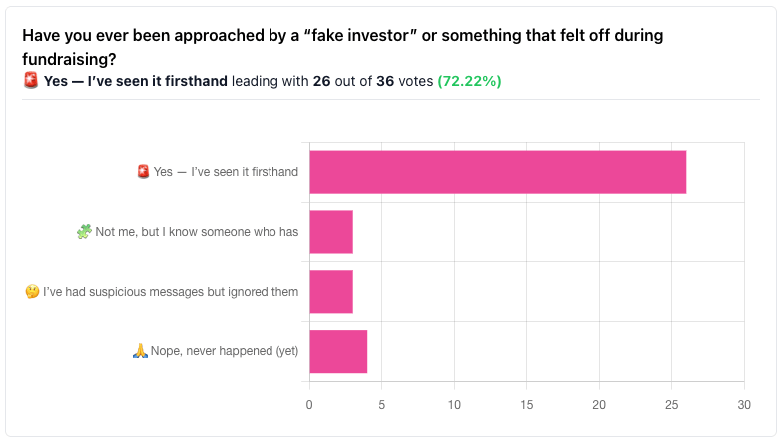
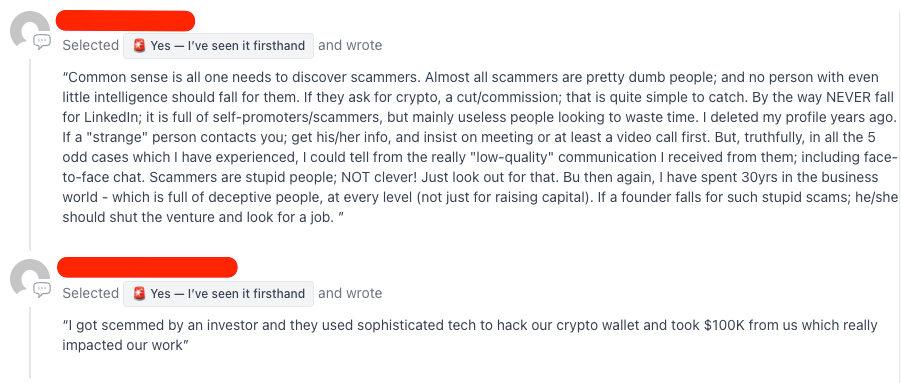

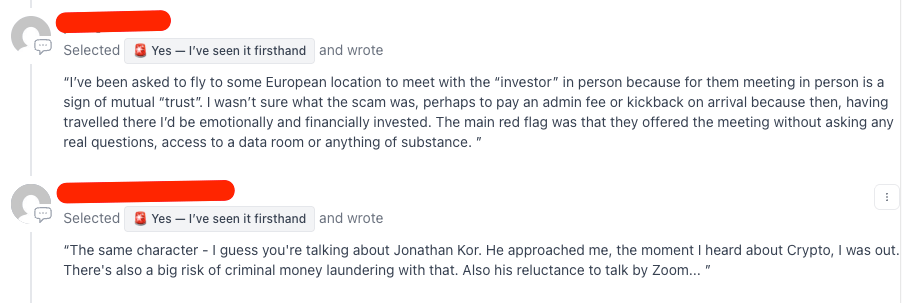


Job Board
💼 Pylyp Samoilenko
Background: Strategy & finance professional with founder and operator experience. Helped scale a healthtech startup from €2M → €5M revenue, secured €2M+ in VC funding, and led M&A due diligence with one of Europe’s largest healthtech firms.
Focus Areas: Product, growth, and strategy.
Currently Seeking: Role in VC or a startup/scaleup at the intersection of product, growth & strategy.
Contact: LinkedIn | [email protected]
🚀 Gaimcontrol
What they do: Building financial services for vulnerable customers — starting with people recovering from gambling addiction. Their first product, Toivo, is live, while the fintech side remains in stealth.
Founder: Jean-Paul Efang Mbome
Looking for: Founding members with early-stage tech or fintech experience to join ahead of the next growth stage.
Contact: LinkedIn | [email protected]
💡 Looking for a job or co-founder?
We feature up to 3 paid spots per issue — if you want your profile seen by thousands of founders and investors, this is your chance.
👉 Submit your profile here to get featured in the next one.
RAFE FOUNDERS EVENTS ❤️
Rare Founders
Open Mic Pitching & Networking - Halloween Special
A high-energy Halloween-themed pitch night where founders deliver rapid-fire ideas, face playful surprises, and compete for investor meetings. The event blends sharp pitches, spirited networking, and a touch of supernatural fun for a truly unforgettable startup experience.
In-person event
Blue Marlin Ibiza | London 45 Curtain Rd, London, EC2A 3PT, UK
Wed 29 Oct, 18:00 - 22:00 BST
Rare Founders
Open Mic Pitching and Networking
An energetic night where founders and innovators pitch, connect, and celebrate bold ideas in a lively, no-suit setting. Expect fast-paced pitches, spontaneous networking, and an atmosphere buzzing with creativity and community.
In-person event
The Fox, Excel Warehouse K, 2 Western Gateway, London E16 1DR, UK
Wed 12 Nov, 17:30 - 22:00 BST
Rare Founders
Co-Founder Matching Night
A fast-paced matchmaking night designed to connect founders, builders, and visionaries through AI-driven psychometric pairing and one-minute co-founder pitches. The event transforms traditional networking into a dynamic experience that sparks genuine partnerships and potential startup success stories.
In-person event
Blue Marlin Ibiza | London, 45 Curtain Rd, London, EC2A 3PT, UK
Mon 17 Nov, 17:00 - 21:30 BST
Rare Founders - building the bridge between founders and investors via regular in-person and online events, meetups, conferences.

